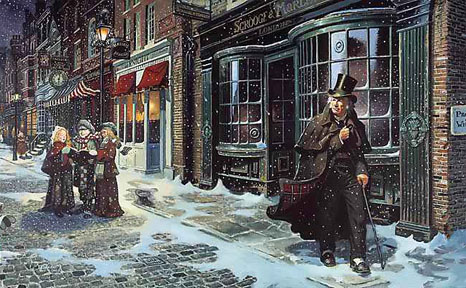
For some time now I’ve been enjoy the book, ‘The Man Who Invented Christmas‘ by Les Standiford. The subtitle is ‘How Charles Dickens’s ‘A Christmas Carol’ Rescued His Career and Revived Our Holiday Spirits.’ As I have felt compelled this holiday season to write my own Christmas tale — and in Dicken’s serial format nonetheless — I was fascinated by the tale of how, after an appearance in Manchester, England, a dejected and troubled Dickens came up with the story that not only would rescue him but an entire holiday at the same time.
I think about Charles Dickens strolling down the streets of Manchester that night in 1843, having his vision of ‘A Christmas Carol’ and how I wish I were there walking beside him. Not that he would have thought much about giving me the time of day. His words impacted nearly one out of four of the English language readers in his day – an astounding figure that not even the likes of J. K. Rowling nor Stephen King can come close to approaching in our one time.
But had I the opportunity, I would have told him of my deepest sympathies with his plight that night; that they mirrored my own. Perhaps in our commiserations we might have found common ground. He had achieved his greatest renown up to that that time in his late twenties as had I. Both of us had suffered from that peculiar myopia that early success inflicts upon its victims; the belief that nothing would ever change, that success was a right and that fortunes only ever rise.
“GUTENBURG MADE EVERYBODY A READER,
XEROX MAKES EVERYBODY A PUBLISHER.”
MARSHALL MCLUHAN (1911-1980) CANADIAN PHILOSOPHER
McLuhan was prophetic in this respect. The changes in the publishing world in our day have been apocalyptic over the last five years … explosive in an industry that only adapts well to changes at glacial speeds. The ebook tidal wave of change regarding how we read has not only made the book cheaper to purchase but has managed to cheapen the words themselves. Just as we cannot listen whilst we are talking, we cannot learn from the words of others when we make ourselves narcissus to our own instant publications.
I have, some years ago, walked the streets of Manchester and experienced the strange wonder of that city. There are, indeed, many ghosts there and one could easily imagine Jacob Marley wondering the cobblestones dragging his chains as Dickens felt he was doing that night and as I sometimes feel as well. But Dickens faced himself that night and in doing so realized that it was not ‘being a man of business’ that was the point of his writing but, as Marley put it:
MANKIND WAS MY BUSINESS. THE COMMON WELFARE WAS MY BUSINESS; CHARITY, MERCY, FORBEARANCE, AND BENEVOLENCE, WERE, ALL, MY BUSINESS. THE DEALINGS OF MY TRADE WERE BUT A DROP OF WATER IN THE COMPREHENSIVE OCEAN OF MY BUSINESS!
So I am grateful to Mr. Dickens giving me – and all of us – a few moments of his time on those wet, shining cobblestones in Manchester and bid him a goodnight. He had not yet written his best work that evening but now he looked forward to better things. So might we, too, all look up and know that we have better things ahead of us. In our ‘business’ of charity, mercy, forbearance and benevolence then Christmas-time be praised – and God bless, Mr. Dickens, and all of us, every one.
